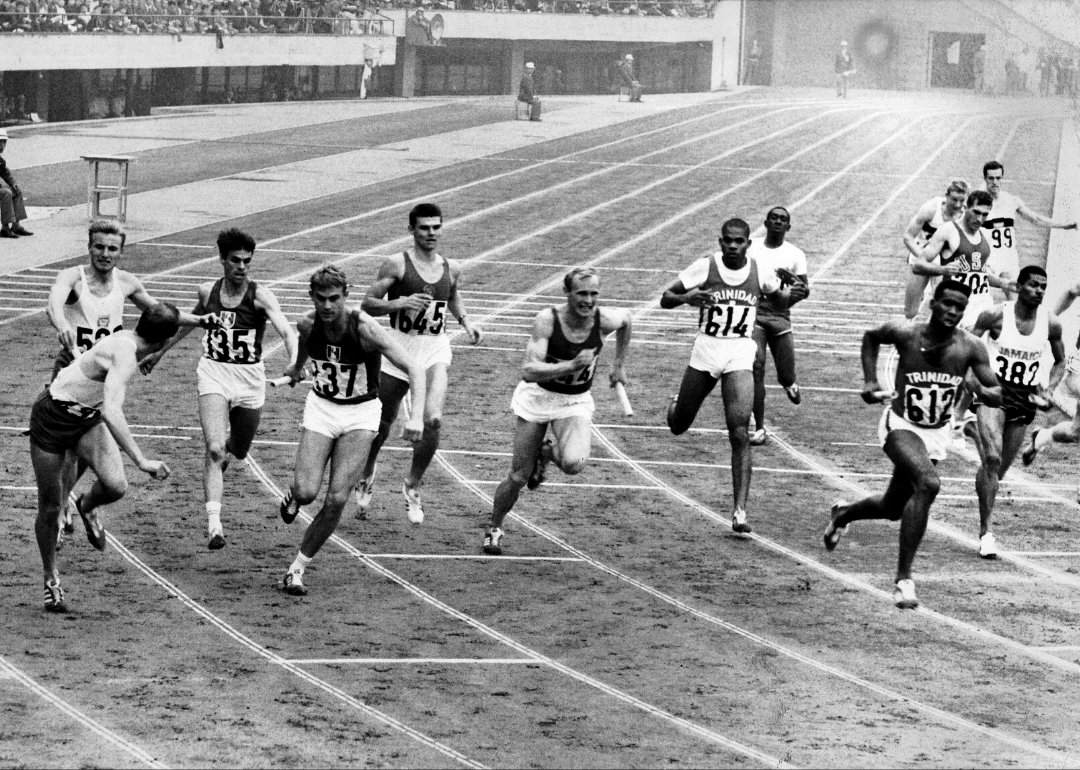
1964: The last time Tokyo hosted the Olympic Games
1964: The last time Tokyo hosted the Olympic Games
When the 2021 Olympics commence July 23, it will be the second time the Japanese city has hosted the Games. The first, for Tokyo and all of Asia, was the 1964 Olympics. The 1964 Games also contained several more firsts: the first time competitions were broadcast live via satellite; the first time 14 new countries participated; the first time the sport of judo entered the competition; and the first time South Africa was excluded during its apartheid era.
Tokyo's first time hosting also came 24 years after the Japanese capital was supposed to host the first time, in 1940. Those Games were moved to Helsinki in 1938 after Japan withdrew due to its involvement in the Second Sino-Japanese War. Regardless, Tokyo wouldn't have been able to host anyway: The Helsinki Games were canceled with the outbreak of WWII.
Now, as the eyes of the world anticipate watching the Games after they were delayed because of the COVID-19 pandemic, the Tokyo Olympics show once more that the will of the world to see every nation's best athletes overcomes even the most severe obstacles.
As we root on our favorite athletes, Stacker looks back at the first time Tokyo hosted the Olympics in 1964 with 25 photos that capture the history and drama of the earlier Games.
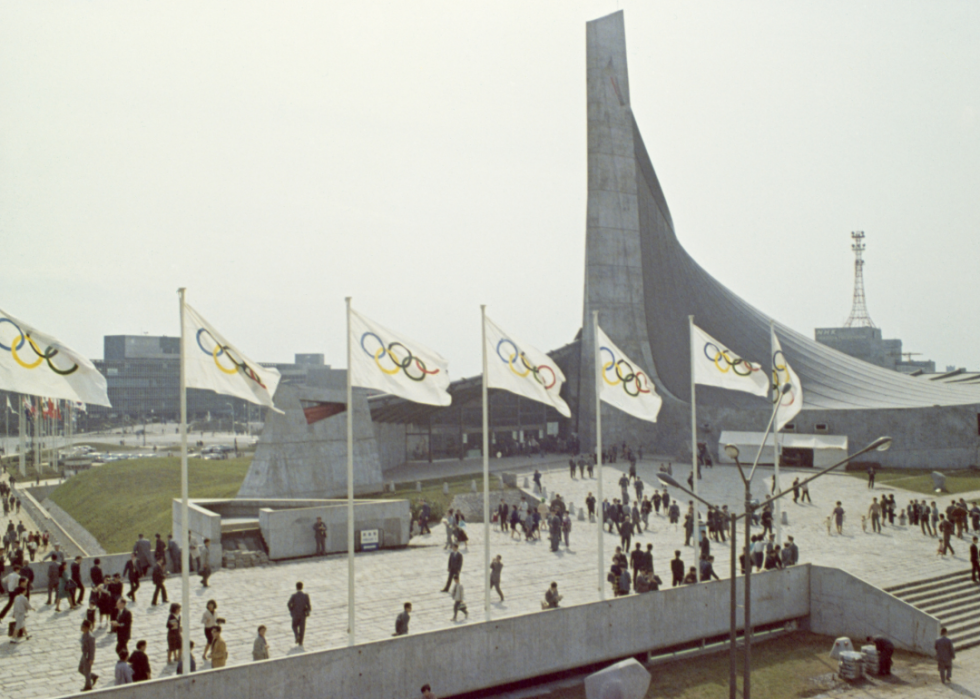
Postwar Japan reemerges
In this photo, Olympic flags fly at Komazawa park in Tokyo. The park was supposed to be constructed for the 1940 Olympics, but the venue was switched from Tokyo to Helsinki after the outbreak of the Second Sino-Japanese War. Then the event was canceled altogether with the start of WWII.
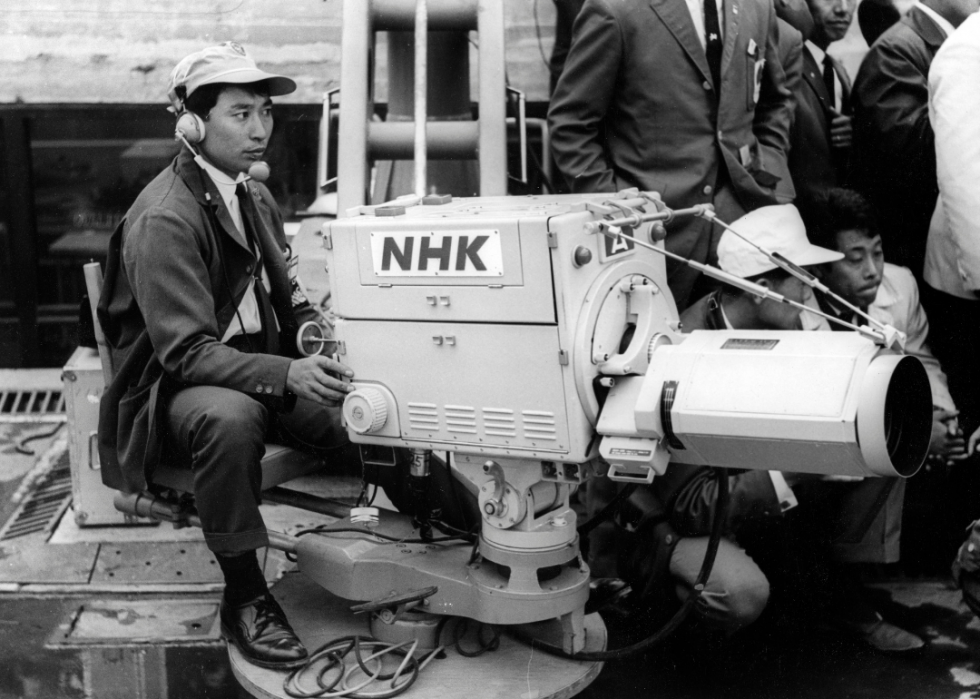
First games to be broadcast live by satellite around the world
A cameraman captures the jumping event in the 1964 Olympics. This marked the first time some U.S. viewers were able to see certain events live, thanks to new satellite technology. Much coverage was still done the old-fashioned way: recorded on tape and flown overseas to be shown on television. For the viewers who lived in the right spots to get a signal, it was a glimpse into the future of live sports broadcasting.
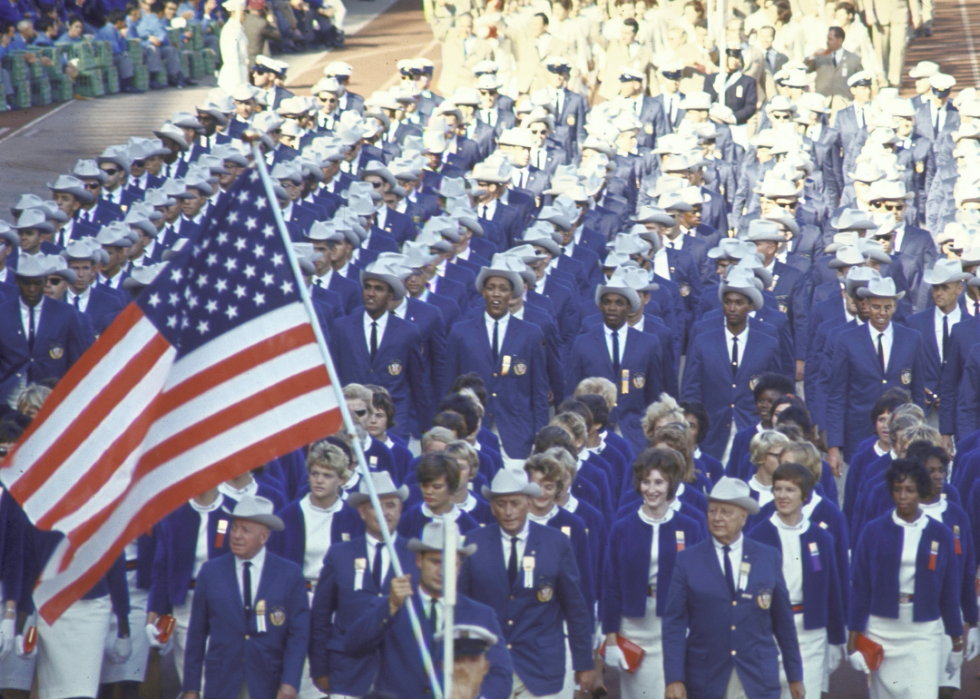
Team USA
The United States team marches into the National Stadium at the opening of the Games in this photo. The U.S. won the most gold medals, and the Soviet Union won the most total medals.
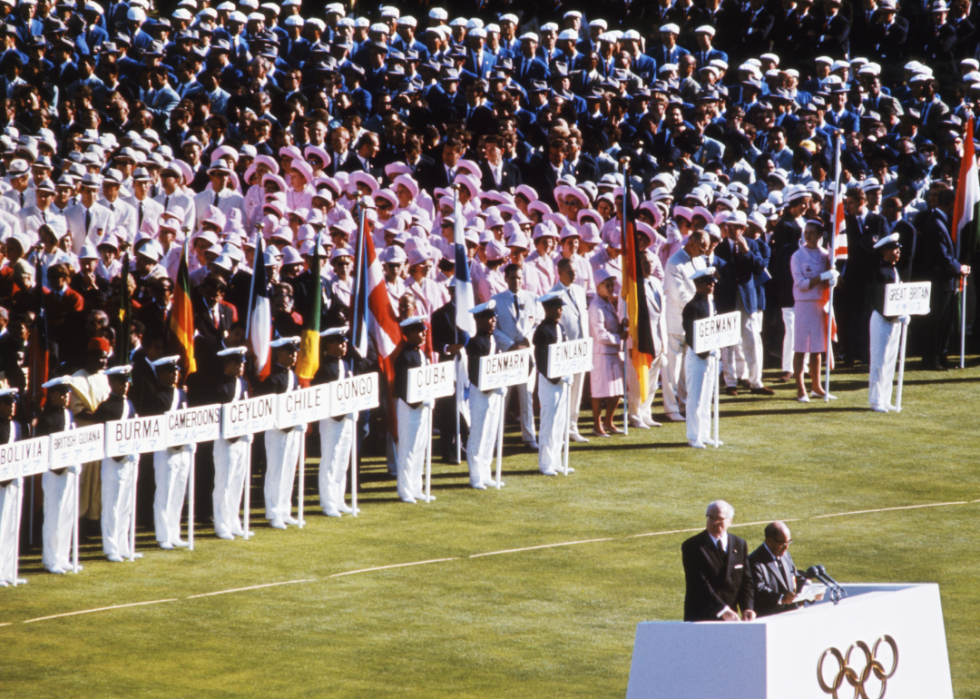
More than 5,151 athletes from 93 nations from around the world
The 1964 Olympics brought in 14 countries that participated for the first time in Tokyo. Most were African countries, including Algeria, Cameroon, Senegal, Chad, Côte d'Ivoire, Congo, Northern Rhodesia (later called Zambia), Mali, Niger, and Tanzania (competing as Tanganyika). Nepal, Mongolia, and the Dominican Republic also sent athletes for the first time, and Germany, at the time divided into East and West, united to compete as the “United Team.”
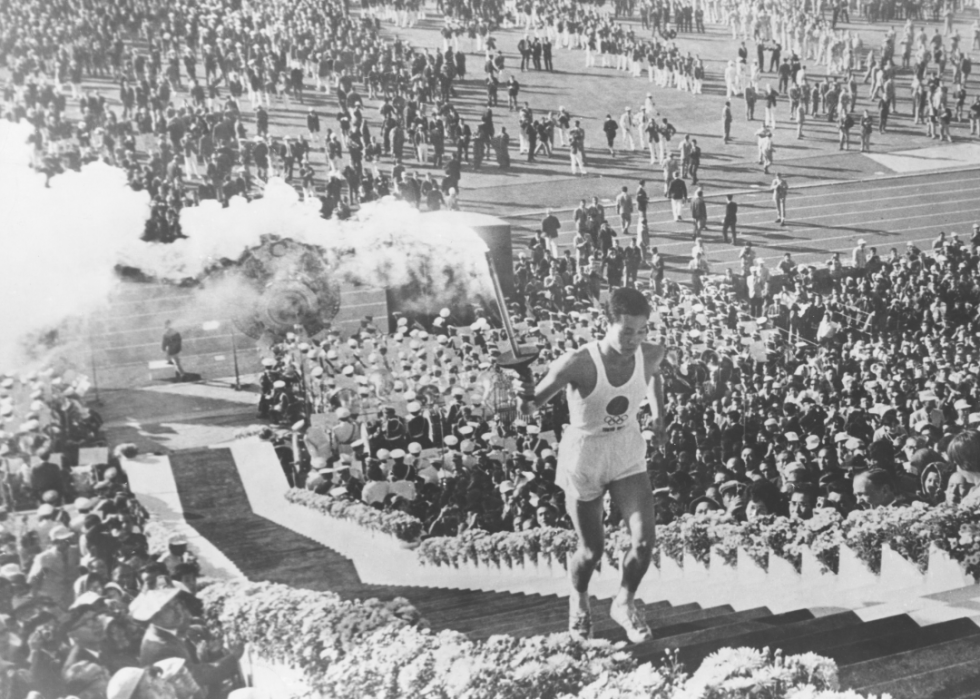
Hiroshima born Yoshinori Sakai lights the Olympic cauldron
Olympic flame torchbearer Yoshinori Sakai mounts the steps to light the cauldron at the opening ceremony. The torch relay was delayed in Hong Kong when a typhoon damaged the plane the torch was to be transported in. To make up for the lost day, the flame was split when it returned to Japan in order to carry out the original route, then reunited.
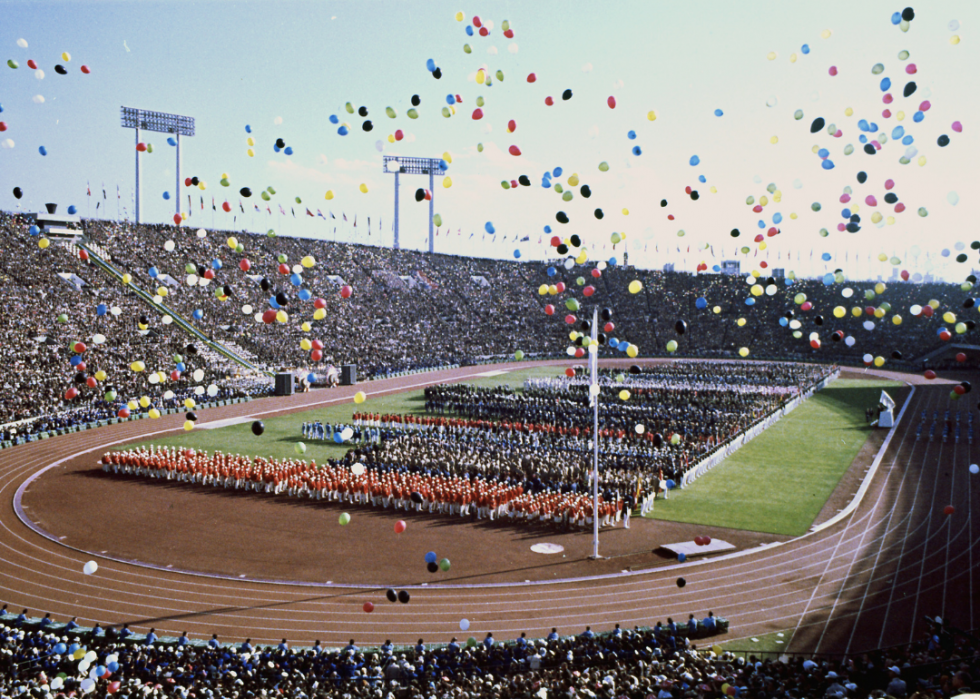
Opening ceremonies held Oct. 10
There is much pomp and circumstance around the opening of the Olympics, including the lighting of the Olympic torch. In Tokyo 1964, the opening ceremony also included a salute of cannons and thousands of balloons released into the sky.
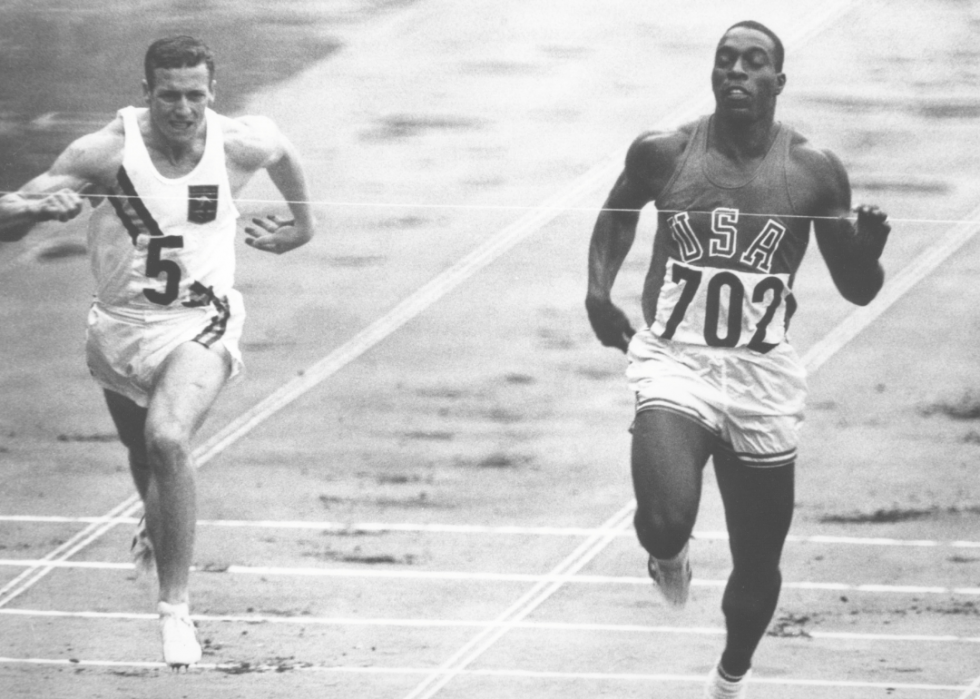
Bob Hayes sets a 100m world record
Robert Hayes (right in photo) as he runs his record-setting race in the men’s 100 meters. Nicknamed “the bullet,” Hayes had already tied a world record earlier in the Games when he ran the relay race. He started off behind the pack, sprinting fast enough to make up for the bad position to win gold for the team. His anchor leg still holds the record to this day, at 8.60 seconds.
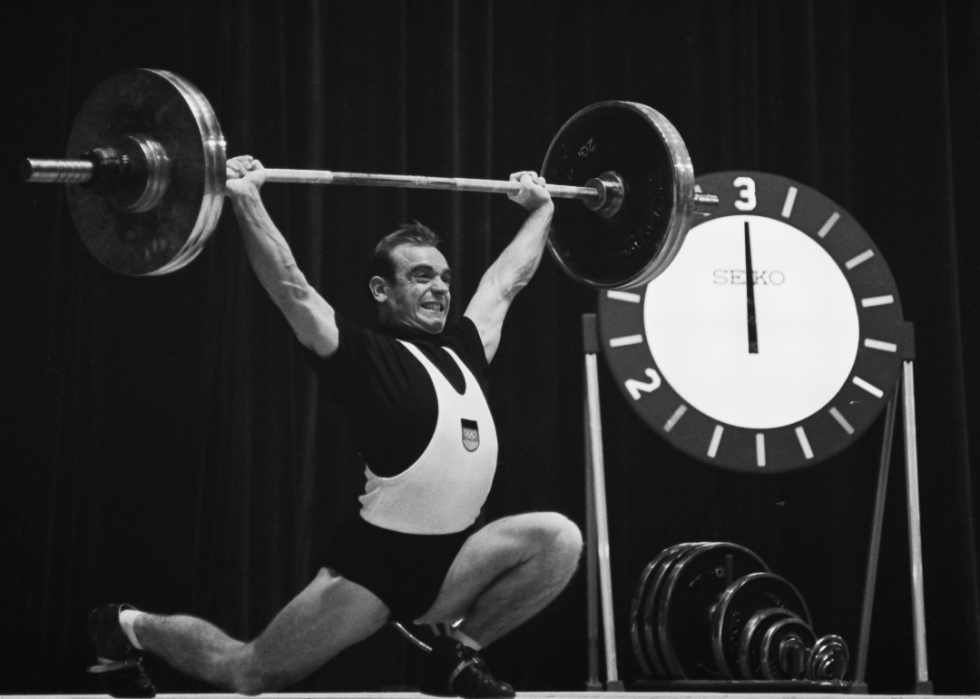
East, West Germany compete as a united team
Alfred Kornprobst of the Unified Team of Germany competes in the Men's Lightweight 67.5 kg weightlifting competition. While the country was divided into East and West Germany, they united to compete in the Olympics for several Games, including 1956, 1960 and 1964. The 1964 Tokyo Olympics were the last time Germany sent a united team, with increasing tensions splitting East and West into separate teams until the 1992 Games, after reunification.
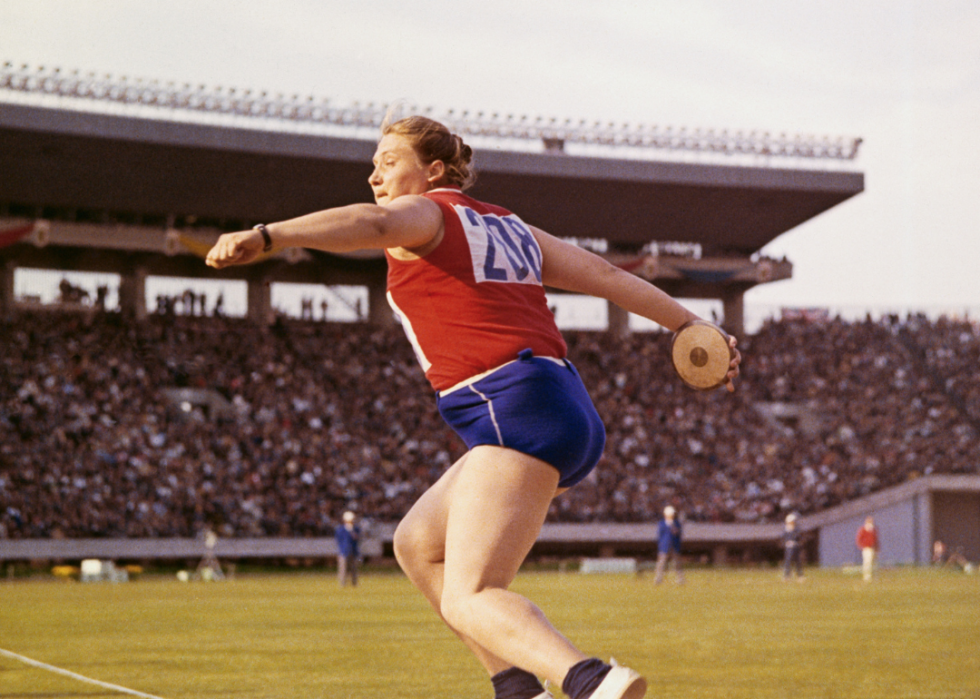
Tamara Press sets a discus world record
Russian athlete Tamara Press absolutely dominated in the discus and shot put competitions in both the 1960 and 1964 Olympics. At the latter, she won the gold in discus and set a world record, just one of 11 records she set during her career: six in discus and five in shot put.
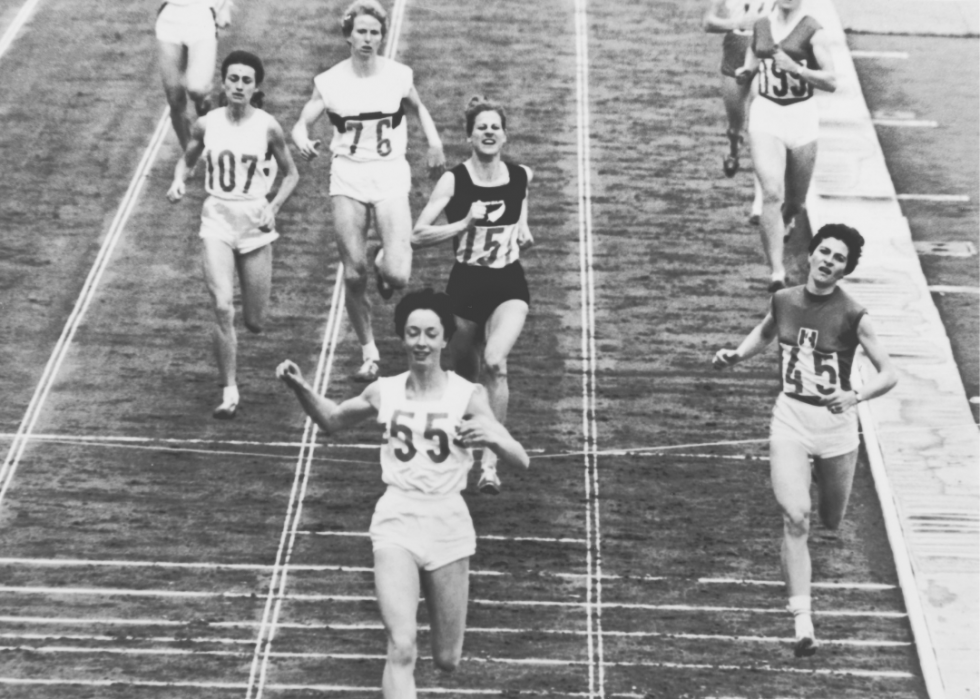
England's Ann Packer sets a world record in the 800m
British runner Ann Packer went to the 1964 Games to run the 400-meter race. She came in second place. So, determined to win gold, she also competed in the 800-meter race, a distance she had only competed in five times before, making her a novice and a longshot amongst the other 800 meter runners. She started slow but, to everyone's shock, came from behind in the second half so fast that she won gold and set a world record of 2:01.1.
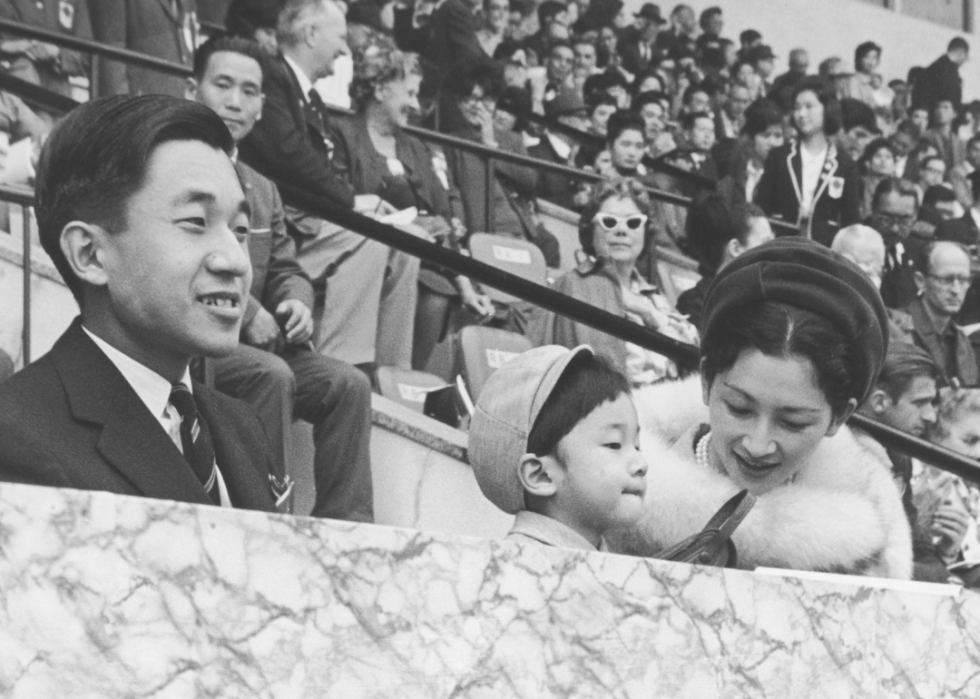
Japanese Royals watch the games
Crown Prince Akihito of Japan watches the start of the marathon at the 1964 Tokyo Olympics, accompanied by his wife Michiko and their son Naruhito, known as Prince Hiro. Prince Akihito was an advocate for the 1964 Tokyo Paralympics, helping to bring the event to life and attending events.
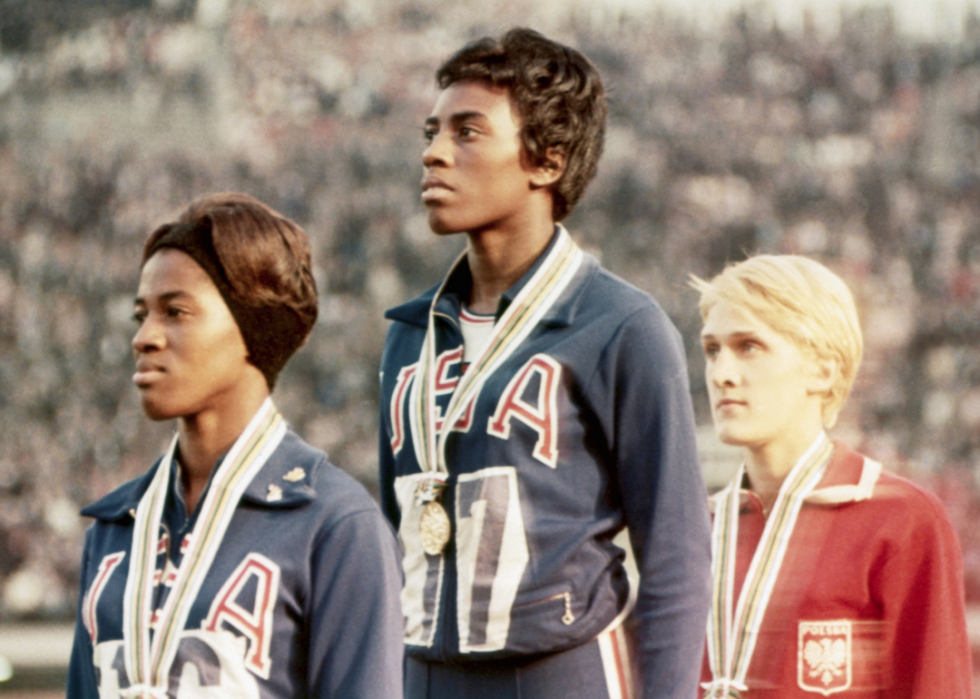
Wyomia Tyus, a 100m champion and trailblazer
Shown here is the victory ceremony in the women's 100-meter run. In first place is Wyomia Tyus of the U.S., second is Edith McGuire of the U.S., and third is Ewa Klobukowska of Poland. Tyus was 19 years old at the time; she participated again in the 1970 Olympics, where she engaged in subtle protest and spoke out against the expulsion of Tommie Smith and John Carlos from the games for their raised fists during “The Star-Spangled Banner.” She later helped form the Women’s Sports Foundation, dedicated to opening up opportunities for girls and women.
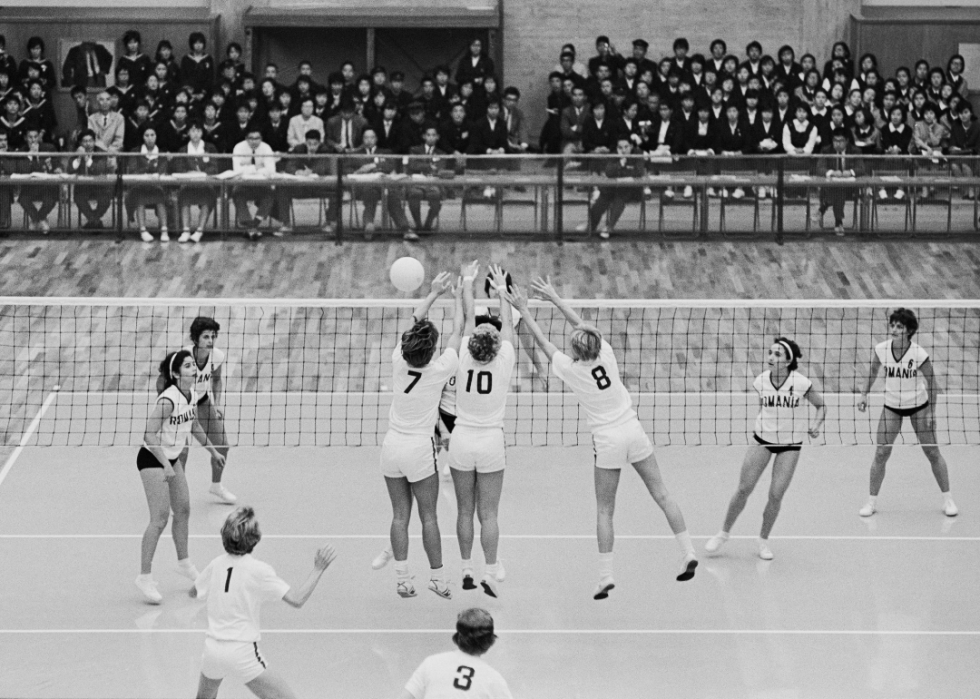
Volleyball makes its Olympic debut
Jane Ward, #10, Mary Peppler, #7, and Mary Perry, #8, of the U.S. team attempt to block the ball against the attack of Romania during their Women's Olympic Volleyball Tournament match. While volleyball was played in a one-off event in the 1924 Olympics, the sport wasn't officially part of the Olympics until 1964. It was exclusively indoor until 1996, when beach volleyball was added.
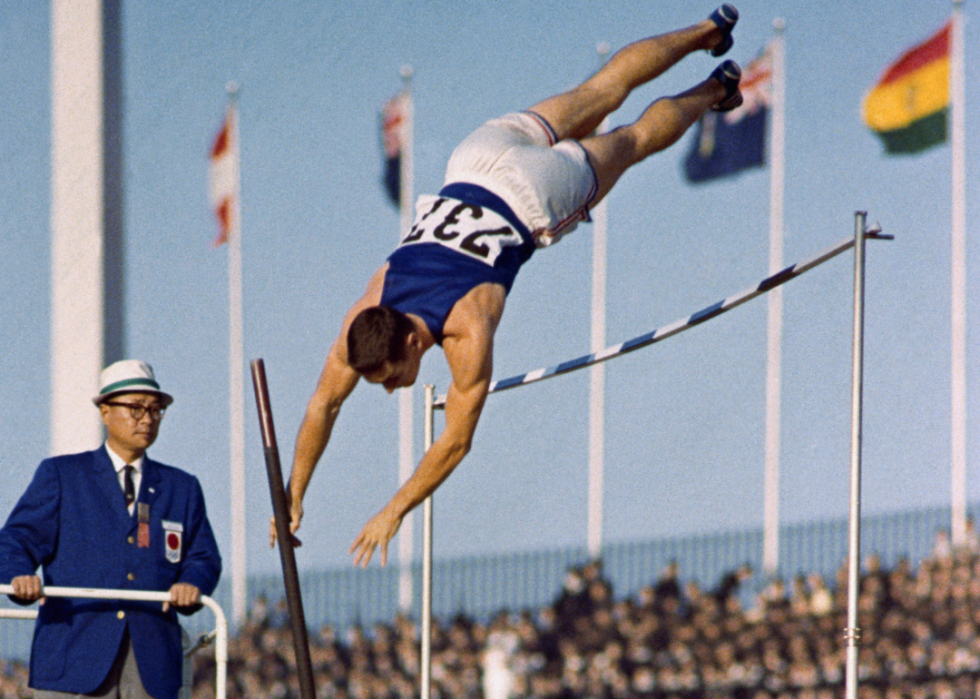
A record-breaking pole vault final
One of the most dramatic events in Olympics history happened in the pole vaulting competition in 1964. The U.S. had won every pole vaulting competition since the revival of the Olympics in 1896, putting a lot of pressure on American Fred Hansen to continue the winning streak. The 1964 competition started at 1 in the afternoon, with so many successful jumps that officials kept raising the bar well into the evening. Finally, when the height reached 5.1 meters, it was between an exhausted Hansen and German Wolfgang Reinhardt. Both failed to clear it twice. Reinhardt failed on his third attempt, but, incredibly, Hansen cleared it and brought home the gold for America once more.
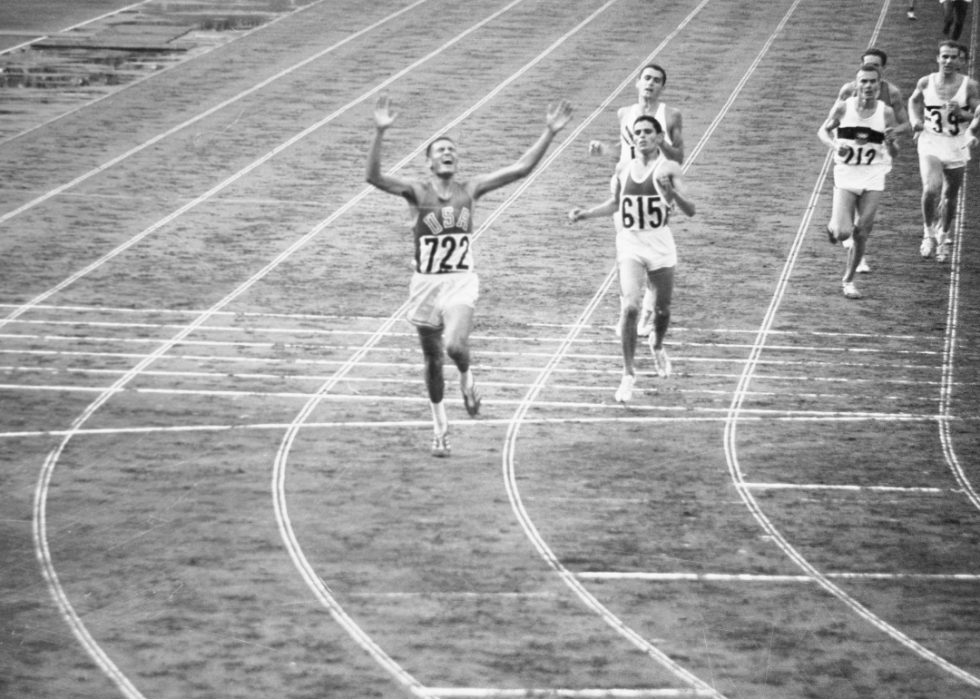
Billy Mills wins the 10,0000m
Billy Mills of the U.S. displays joy after crossing the finish line first in the 10,000-meter race. He set a record time of 28:24.4. A member of the Ogala Sioux tribe, Mill is the only American to win the 10,000-meter race, and received the Presidential Citizens Medal, awarded by President Barack Obama, in 2012.
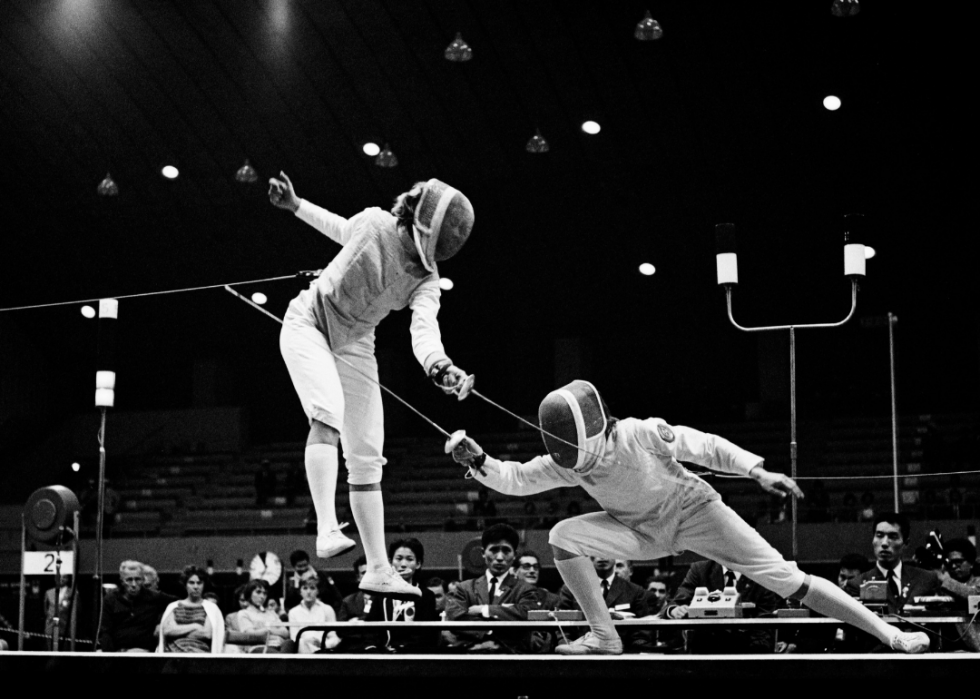
Hungary wins gold in fencing
Lyudmila Shishova of the Soviet Union (left) leaps into the air as she competes against Lídia Sakovicsne Domolky of Hungary in the Women's Team Foil Fencing competition. Fencing has been a part of the Olympics since the first modern Games were held in 1896.
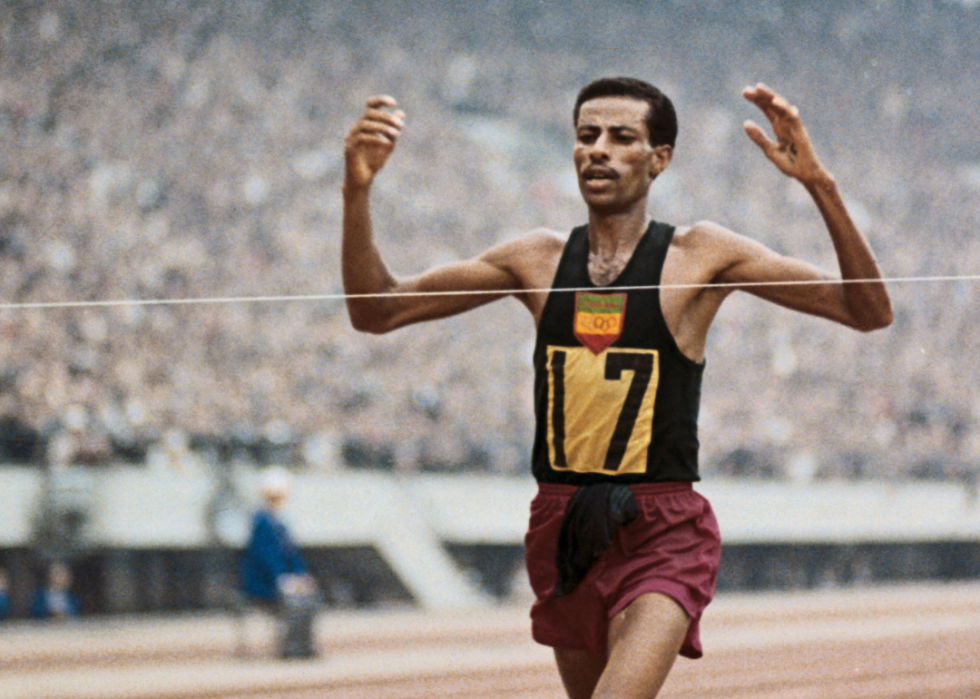
Abebe Bikila wins his second Olympic marathon in record time
Abebe Bikila of Ethiopia joined the previous 1960 Olympics in Rome as a last-minute replacement who, finding his new shoes gave him blisters, ran the cobbled streets barefoot, winning gold and setting a new record. All eyes were on his return in 1964, where he was a favorite to win even though he had spent a week in the hospital after an emergency appendectomy a mere month before the race.
Bikila not only won gold in Tokyo but set a world record, beat the nearest competitor by four minutes, and became the first and only person to win two Olympic marathons. In this photo, he raises his arms in victory as he wins the marathon event in two hours, 12 minutes, and 11.2 seconds.
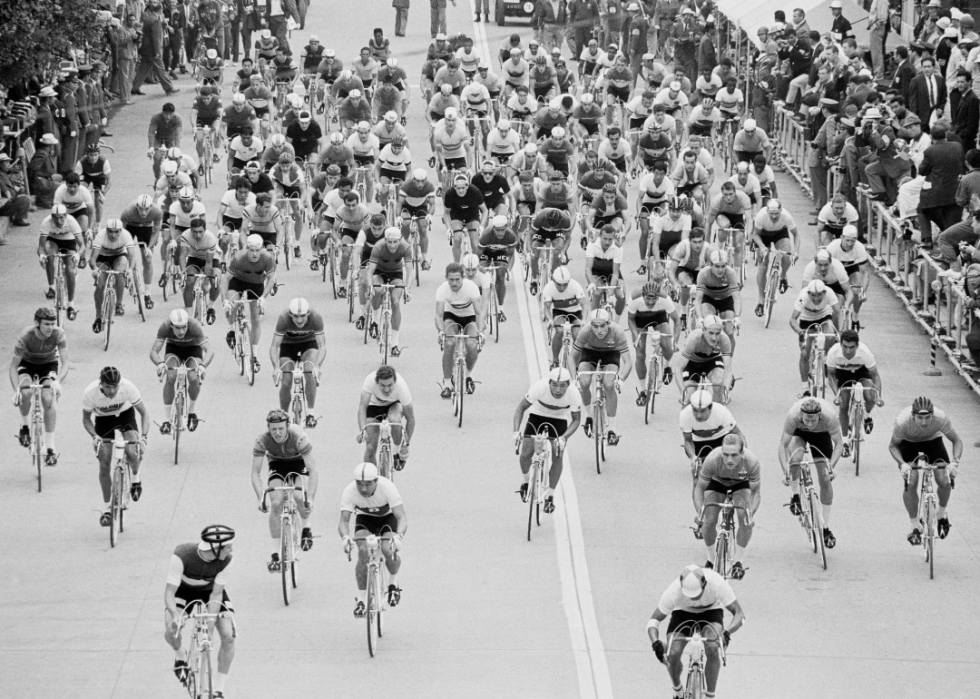
An epic finish to a cycling race
With an unusual course and no breakaway group from the peloton, the finish at the Tokyo men’s individual cycle road race was up for grabs in the final seconds. It resulted in the tightest finish ever at the Olympics, with 51 riders clocking in at 4:39:51, necessitating winners to be determined by hundredths of a second. In the end, it was Mario Zanin of Italy who took home the gold with a time of 4:39:51.63, followed by Kjell Rodian of Denmark (4:39:51.65), and Walter Godefroot of Belgium (4:39:51.74).
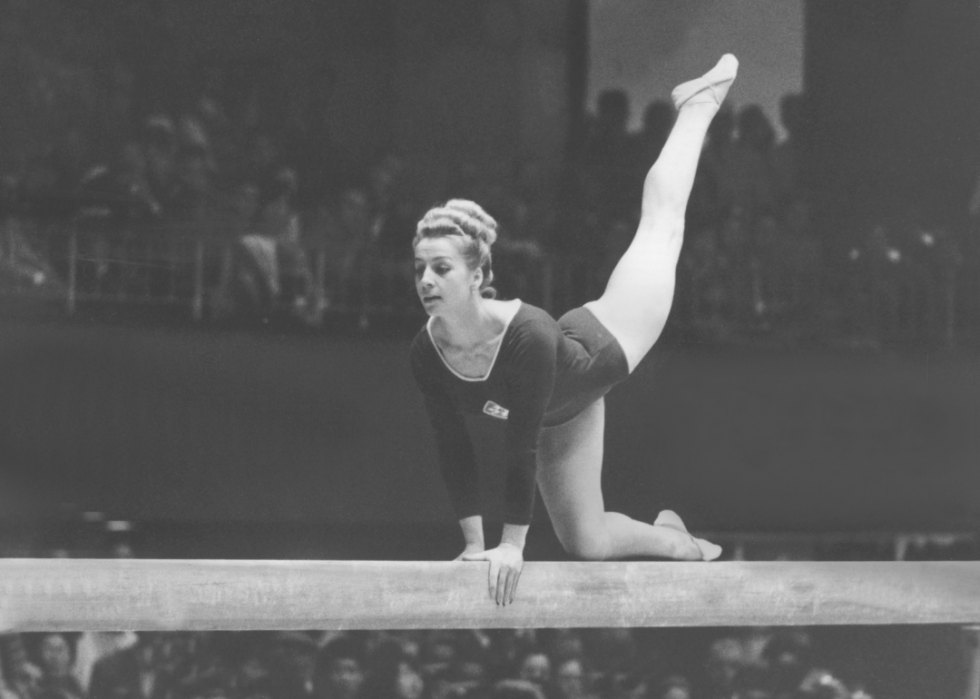
Czechoslovakia’s Vera Caslavska wins three gold medals in gymnastics
The Czech gymnast Vera Caslavska during her freestyle on the balance beam. She won three gold medals in 1964 and was expected to do just as well in the 1968 Games. However, two months before they began, Soviet tanks entered Prague, and Caslavska went into hiding. With no facilities, she practiced as best she could by using trees to swing and practicing her floor routine in a meadow. She was allowed to travel to Mexico City for the 1968 Games, where the pressure to beat the Soviet Union athletes was paramount. She did, winning two golds and two silvers.
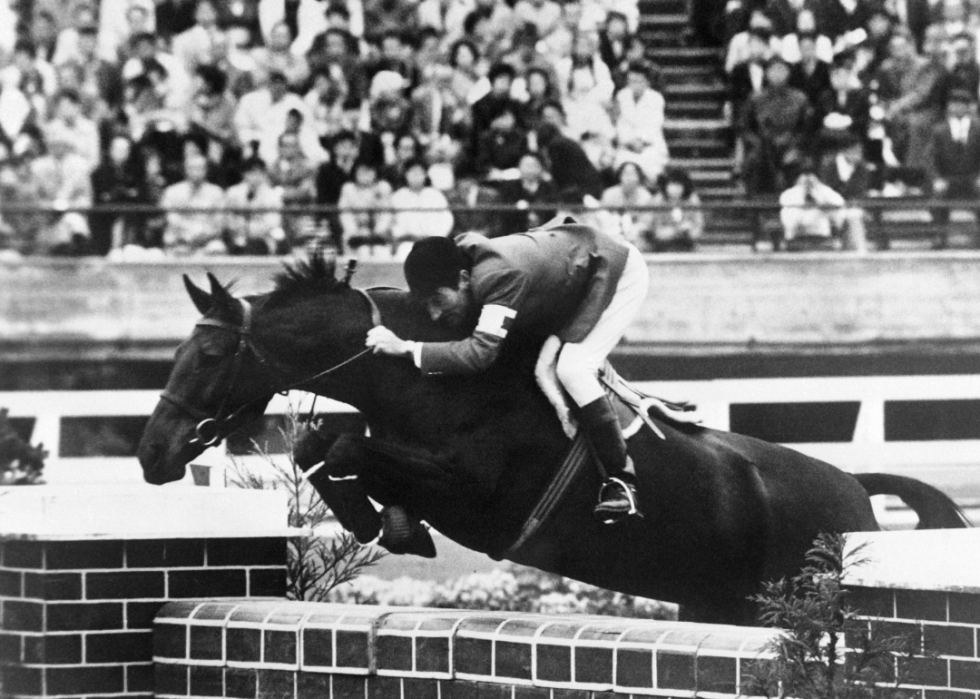
France's Pierre Jonquères wins his second gold in show jumping
The French horse rider Pierre Jonquières D'Oriola on "Lutteur" during the show jumping Grand Prix. He went on to win gold. D'Oriola also won gold 12 years earlier, at the Helsinki Olympics—the 1952 Games that Helsinki hosted after the 1940 Games, originally scheduled for Tokyo, then moved to Helsinki, were canceled with the start of WWII.
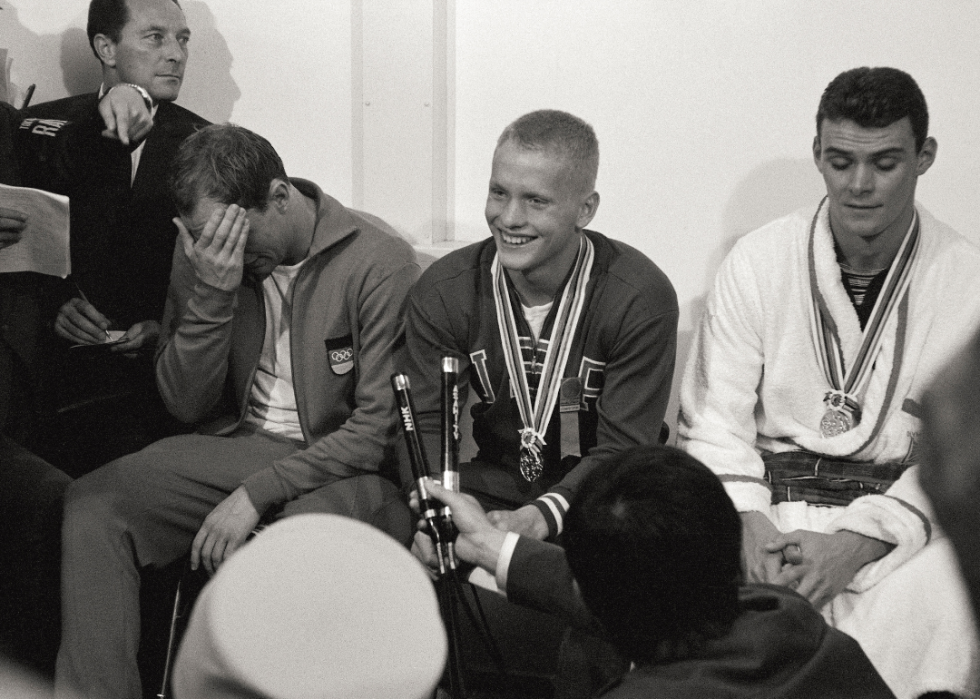
Swimmer Don Schollander wins a record four gold medals
Don Schollander was already breaking records before he joined the American swimming team at the 1964 Tokyo Olympics. He had become the first person to swim 200 meters in under two minutes a year earlier. He was also very young—just 18 years old when he went to the Tokyo Olympics. He became the first swimmer to win four gold medals at an Olympic Games, and was the most successful overall of any competitor in all categories.
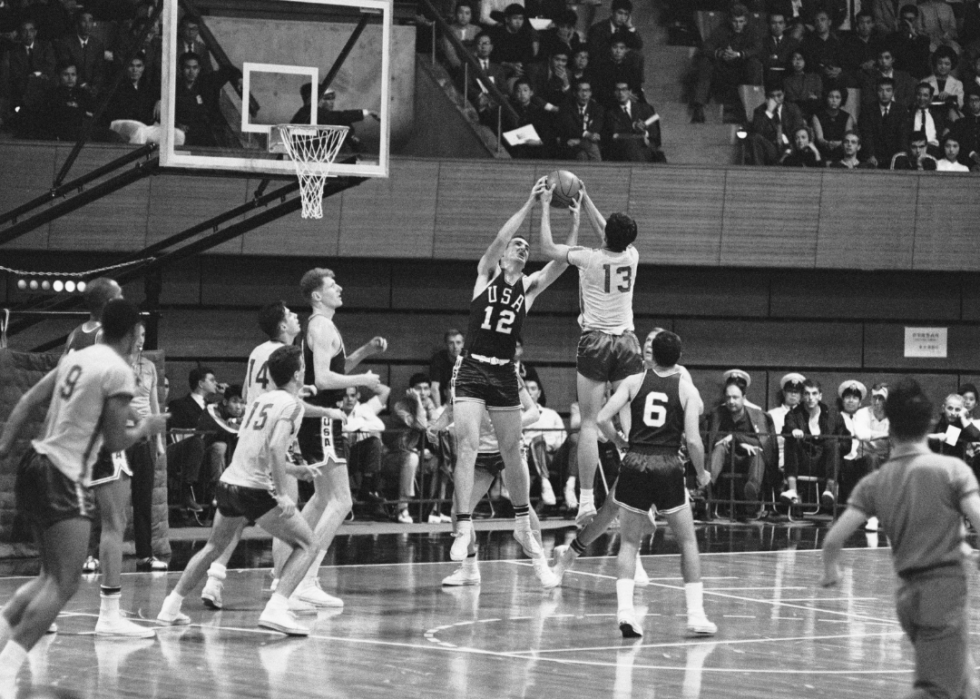
Team USA wins gold in basketball
US JP McCaffrey (12) and Brazil's V. Mirshawka tussle for the ball during an Olympic basketball game Oct. 17th. The Americans won 86-53 for their 44th straight Olympic hoop win.
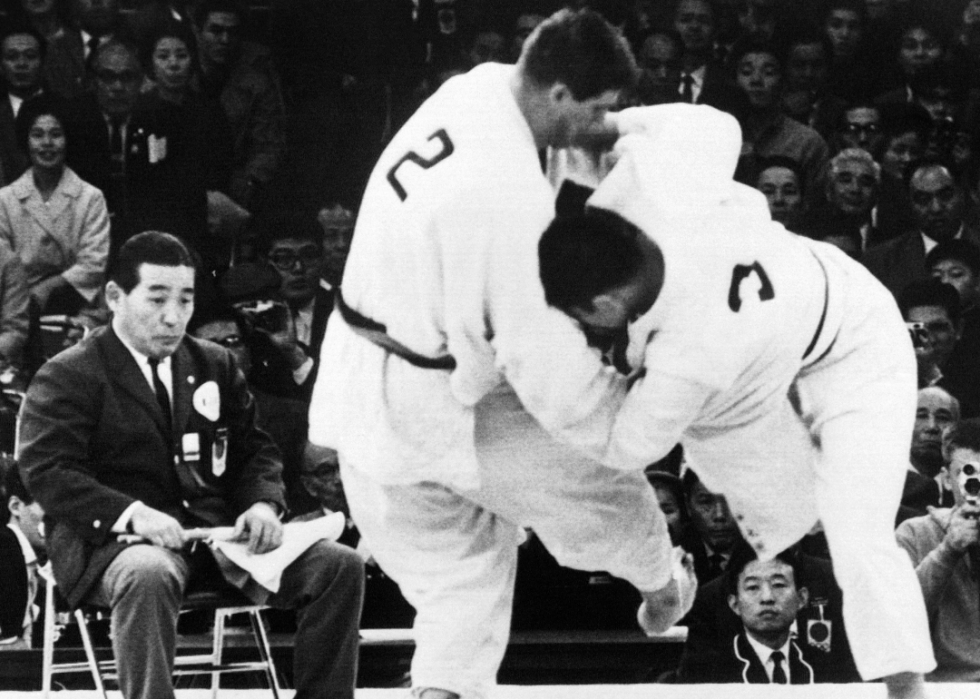
Judo makes its Olympics debut
Judo had never before been part of an Olympics lineup, but appropriately for the Games taking place in Japan, debuted in the Tokyo Olympics. The sport had long been dominated by Japanese athletes, making Dutch Anton Geesink’s gold win all the more surprising. In this photo, the winners of the Judo Men's Openweight event line up for their medals. From left to right: Akio Kaminaga of Japan (silver), Anton Geesink of the Netherlands (gold), and Theodore Boronovskis and Klaus Glahn (joint bronze winners).
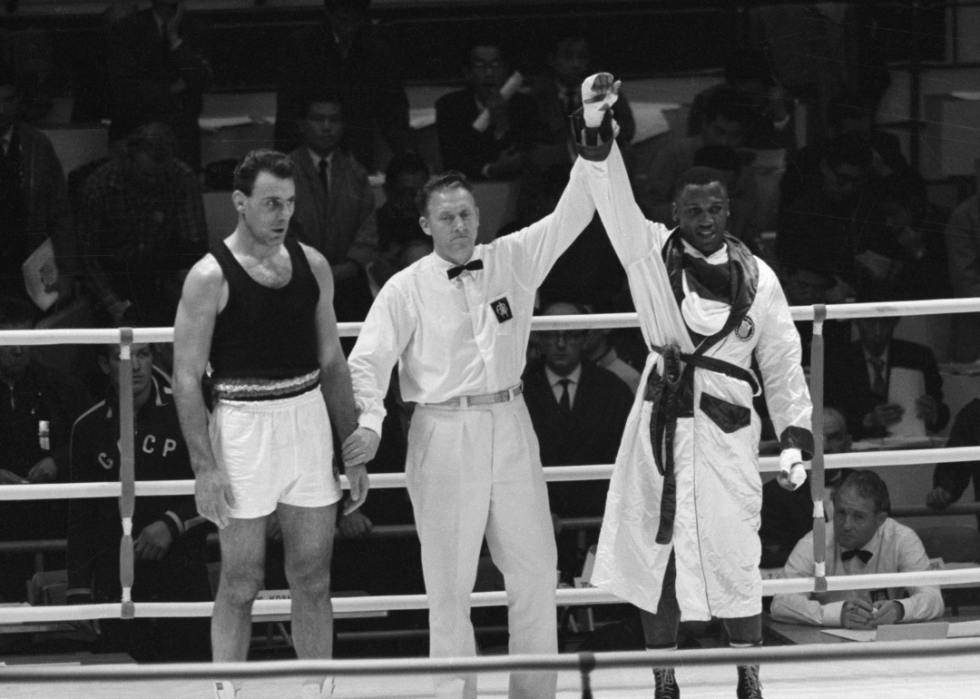
Joe Frazier wins heavyweight boxing gold
Joe Frazier of Philadelphia raises his right arm after winning the Olympic heavyweight boxing match against Germany's Hans Huber Oct. 23. Frazier won the bout by a decision and gained another gold medal for the U.S., which clinched the Olympics gold medal championship.
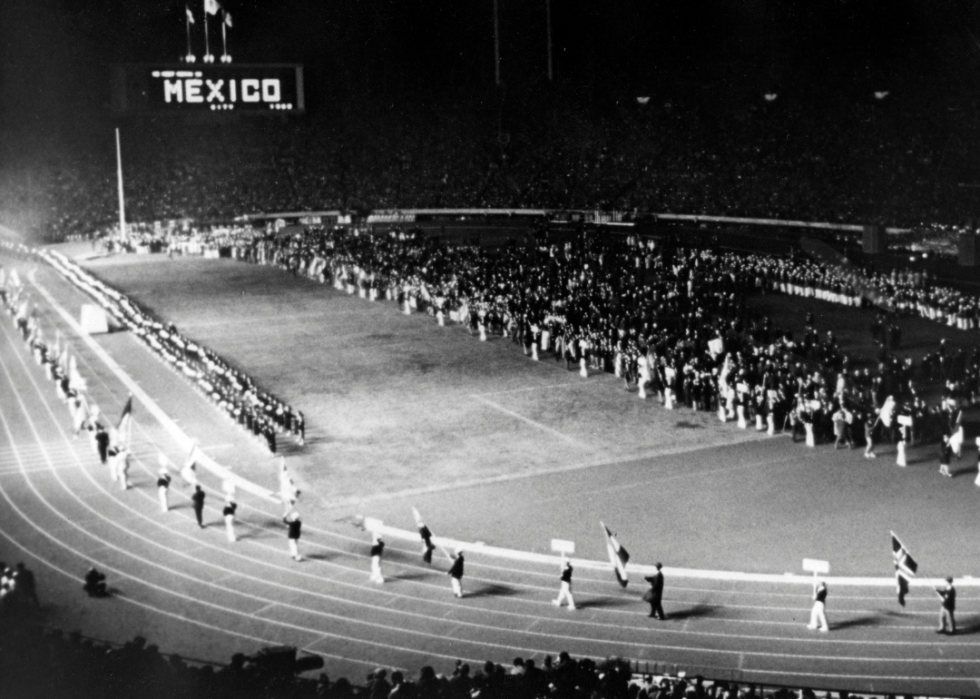
Closing ceremony
On October 24, 1964, the 1964 Olympics came to a close. Japan's participation as a host country in the Olympics is one marked by both global catastrophes and triumphs. Tokyo's second time hosting the Olympics was also delayed—this time, because of the coronavirus pandemic.



